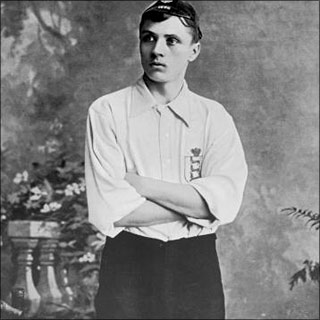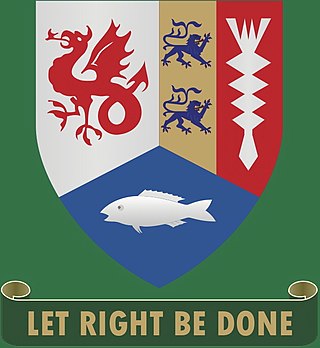The Ruhleben barracks is part of the German naval establishment located in Plön, Holstein, Germany.

StephenBloomer was an England international footballer and manager who played for Derby County – becoming their record goalscorer – and Middlesbrough. The anthem "Steve Bloomer's Watchin'" is played at every Derby home game and there is a bust of him at the Pride Park Stadium. He is also listed in the Football League 100 Legends and English Football Hall of Fame.
As a Nazi concentration camp for forced labor, Helmbrechts concentration camp was a women's subcamp of the Flossenbürg concentration camp founded near Helmbrechts near Hof, Germany in the summer of 1944. The first prisoners who came to the camp were political prisoners from the Ravensbrück camp in northern Germany. Later Jewish prisoners were brought.

Ruhleben is a Berlin U-Bahn station, the western terminus of line U2. Named after the adjacent Ruhleben neighbourhood, it is located in the Westend district close to the border with Spandau.

Ruhleben internment camp was a civilian detention camp in Germany during World War I. It was located in Ruhleben, a former Vorwerk manor 10 km (6.2 mi) to the west of Berlin, now split between the districts of Spandau and Charlottenburg-Wilmersdorf. The camp was originally a harness racing track laid out north of the Berlin-Hamburg Railway line in 1908.
To Ruhleben – And Back is Geoffrey Pyke's memoir of his experiences in the Ruhleben internment camp. While at Cambridge University, Pyke convinced the editor of the London Daily Chronicle to make him the paper's correspondent in Berlin during World War I. Pyke was captured and sent to Ruhleben with about 4,000 other foreign prisoners. In 1915, after a year in Ruhleben, Pyke escaped into the Netherlands, and from there back to the United Kingdom. Pyke's experiences and memoir brought him minor fame at the time, but were soon forgotten.
Samuel Wolstenholme was an English footballer who played for, among others Everton, Blackburn Rovers, Norwich City and England. He played alongside Steve Bloomer and Vivian Woodward in the England teams that won the British Home Championship in 1904 and 1905. He also played twice for The North XI against The South XI and played for the English League XI against the Scottish League XI.

John Cameron was a Scottish footballer and manager. He played as a forward for Queen's Park, Everton and Scotland and was noted as an effective goal-maker and goalscorer. In 1899 he became player-manager at Tottenham Hotspur and guided them to victory in the 1901 FA Cup. As a result, they became the only club outside the English Football League to win the competition. In 1898 he became the first secretary of the Association Footballers' Union, which was the ill-fated fore-runner of the Professional Footballers' Association. He later coached Dresdner SC and during the First World War he was interned at Ruhleben, a civilian detention camp in Germany. After the war he coached Ayr United for one season and then became a football journalist, author and publisher. He had previously worked as a columnist for various newspapers before the war.
John Brearley was an English football player and manager. He played as a forward for several clubs, most notably Millwall Athletic, Everton and Tottenham Hotspur. He was able to play in at least five outfield positions, but had a preference for playing inside-right. During the First World War he was interned at Ruhleben, a civilian detention camp in Germany.
Edwin Dutton was an Anglo-German footballer and coach. Dutton played as a forward for Britannia Berlin 92, BFC Preussen, Newcastle United and Germany. During the First World War he was interned at Ruhleben, a civilian detention camp in Germany. During the 1920s he managed Stuttgarter Kickers and became the first professional trainer at Ipswich Town.

Westend is a locality of the Berlin borough Charlottenburg-Wilmersdorf in Germany. It emerged in the course of Berlin's 2001 administrative reform on the grounds of the former Charlottenburg borough. Originally a mansion colony, it is today a quite densely settled, still affluent territory adjacent to Berlin's inner city in the east.

The U12 is an inactive Berlin U-Bahn line. It existed between 1993 and June 2003, as a peak-time and night line between Ruhleben and Warschauer Straße stations. The route remains available for temporary use when it is not possible to run a full U1 or U2 service for reasons such as maintenance.

Bus transport is the oldest public transport service in Berlin, the capital city of Germany, having been introduced in 1846. Since 1929, services have been operated by the Berlin Transport Company, although during the Cold War-era division of the city they operated in West Berlin only. BVG's fleet consists of 1,550 vehicles, which cover 300,000 kilometres per day.

The Berlin–Lehrte railway, known in German as the Lehrter Bahn, is an east–west line running from Berlin via Lehrte to Hanover. Its period as a separate railway extended from its opening in 1871 to the nationalisation of its owner, the Magdeburg-Halberstadt Railway Company on 1 July 1886. The company's Berlin station, the Lehrter Bahnhof was finally torn down in 1958.
James Frederick Keel was an English composer of art songs, baritone singer and academic. Keel was a successful recitalist and a professor of singing at the Royal Academy of Music. He combined scholarly and artistic interest in English songs and their history. His free settings of Elizabethan and Jacobean lyrics helped pioneer the revival of interest in the genre. He was also an active member of the English folksong movement. During World War I, Keel was held in the civilian internment camp at Ruhleben in Germany, where he played an active role in the camp's musical life, giving many recitals to help boost the morale of his fellow detainees. Keel was one of the few singer-songwriters of English art songs of his day. Among his better-known compositions are settings of Salt-Water Ballads by the poet John Masefield, including "Trade Winds", the popularity of which has given Keel a reputation for being a "one-song composer".

Israel Cohen was an Anglo-Jewish, Zionist leader, writer, and journalist, who served as secretary of the World Zionist Organization.

King Alfred School, Plön, was a boarding school for children whose parents were British military or civil service personnel working in Germany; between 1948 and 1959, it educated approximately 4000 pupils aged between 11 and 18 years old.
In Prison is a 1915 song by composer Frederick Keel, composed in 1915 in the civilian Ruhleben internment camp on the former racecourse in Berlin where Keel was interned along with other artists and musicians including Edgar Bainton, Ernest MacMillan, Leigh Henry and Benjamin Dale. The text is from A Good Knight In Prison, or simply In Prison by William Morris from The Defence of Guenevere, and Other Poems 1858.
William Morris In Prison: "Wearily, drearily, half the day long, flap the great banners, high over the stone. Strangely and eerily, sounds the wind's song, bending the banner-poles..."
Sir John Moore Barracks may refer to:









